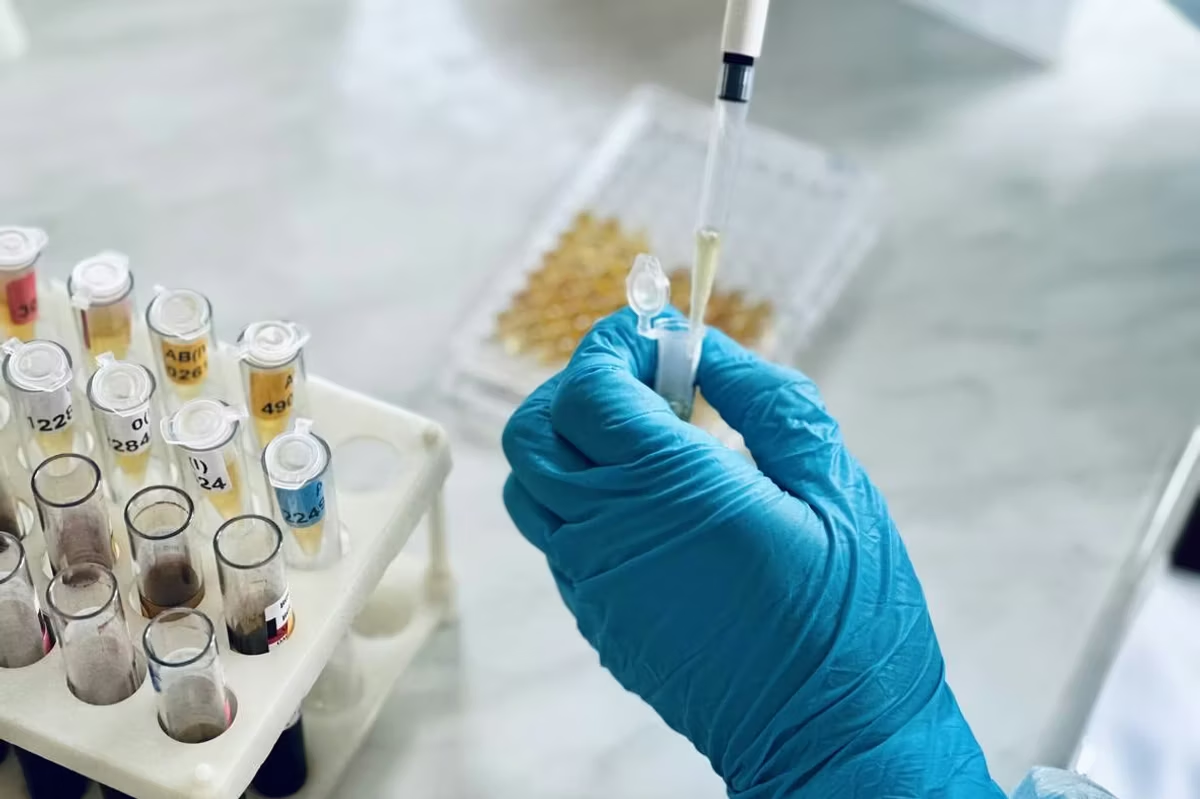Your body is full of information that can give you a clearer picture of what’s going on inside it. Sometimes you just need the right book of translations to understand what it’s trying to tell you. For cancer, biomarkers (short for biological markers) can be that translator.
Biomarkers are useful tools to help you and your medical team understand your diagnosis, gene makeup and treatment options. Read on to learn what biomarkers are and how they can be helpful if you’ve been diagnosed with colorectal cancer, also commonly called colon cancer.
What are biomarkers?
Biomarkers are molecules in bodily fluids or tissues that can be measured to indicate whether the body has a specific condition or how effectively it responds to a treatment.
There are seven types of biomarkers:
- Susceptibility/risk biomarkers — predict how likely it is that you’ll develop a particular condition
- Diagnostic biomarkers — detect or confirm a condition
- Prognostic biomarkers — predict the likelihood of a condition getting worse or coming back
- Monitor biomarkers — determine the status of a condition or the body’s response to treatment
- Predictive biomarkers — help predict whether a person would respond well to specific treatments
- Pharmacodynamic response biomarkers — show how the body has responded to treatments
- Safety biomarkers — determine the level of toxicity in the body after a treatment
Who needs biomarker testing?
Some biomarkers are used in routine screening, like your blood pressure. Other types of biomarker testing can be helpful for people living with certain diseases, including cancer. Because cancer is different from person to person at the gene or protein level, biomarker testing helps healthcare providers (HCPs) create a personalized treatment plan that can target your specific tumor. Your HCP can help you decide if biomarker testing is right for you.
How are biomarkers tested?
For people living with cancer, biomarker testing is done by taking samples of cancer cells. This can be done by taking a sample of tissue or cells from the tumor (called a biopsy), a blood sample or liquid biopsy, a bone marrow sample, or a sample from other bodily fluids, such as urine or saliva.
Sometimes samples of your healthy cells will also be taken to compare the biomarker tests between healthy cells and cancer cells.
What type of biomarkers are tested for colorectal cancer, and when should the tests be done?
There are four common types of predictive biomarkers found in colorectal cancer:
- KRAS
- NRAS
- BRAF
- HER2
People with stage 4 colorectal cancer should be tested for at least these biomarkers when they’re first diagnosed to help determine the most effective treatment options.
People with colorectal cancer should also be tested for high microsatellite instability (MSI-H). In most cases, this mutation is not hereditary. But in a small percentage of people, this genetic mutation is passed on through your genes and can be caused by Lynch syndrome. Lynch syndrome can increase your risk for many types of cancer.
During treatment, testing for prognostic biomarkers such as carcinoembryonic antigen (CEA) will help determine how well the treatment is working and whether there are any recurrences.
If the cancer does come back, biomarker testing should be done to see how well the body might respond to new treatments and whether the cancer has spread.
What are the most common colorectal biomarkers?
MSI-H: About 15 out of 100 of all colorectal cancers and about 4 out of 100 stage 4 colorectal cancers have an MSI-H mutation. Surgery and immunotherapy are usually the preferred treatment options for this type of tumor.
KRAS: A mutated KRAS protein can cause uncontrollable cell growth and lead to cancer. About 2 out of 5 colorectal cancer tumors have a KRAS mutation. Chemotherapy and other targeted treatments are typically the most effective options for a person with KRAS mutation.
NRAS: Similar to KRAS mutations, NRAS mutations can cause uncontrollable cell growth and lead to cancer. NRAS mutations are only found in about 3 to 5 out of 100 colorectal cancer tumors. Chemotherapy and other targeted treatments are typically the best options for people with a NRAS mutation.
BRAF: Like KRAS and NRAS, BRAF mutations can cause uncontrollable cell growth and lead to cancer. A BRAF mutation typically means the cancer is aggressive and may be at a later stage. Chemotherapy, other targeted treatments or a combination of treatments may be recommended for people with a BRAF mutation.
HER2: The HER2 biomarker measures the amount of HER2 protein being released. HER2-positive means there is too much of the protein being released, which can lead to uncontrolled cell growth and cancer. HER2-positive cancers are more common in those who do not have a KRAS, NRAS or BRAF mutation. The treatment for cancer with a HER2-positive biomarker is typically anti-HER2 therapies, sometimes called HER2 inhibitors.
CEA: The gastrointestinal tract releases CEA into the blood. Colorectal cancer cells can also release CEA into the blood. Because healthy adults typically have low levels of CEA, test results showing high levels might mean there is a large tumor present or that the cancer has spread to other locations in the body.
While these are some of the most common biomarker tests for colorectal cancer, there are other biomarker tests your HCP may recommend as well.
Is biomarker testing covered by insurance?
Whether biomarker testing will be covered by insurance varies from plan to plan and state to state. There are currently 18 states with mandatory biomarker testing coverage laws for state-regulated plans. Several more states are introducing laws this year.
Talk to your HCP about what types of biomarker testing you may need, and contact your insurance provider to find out if your tests will be covered.
This educational resource was created with support from Merck.
- As a Mom, I Always Put My Needs Last – Until Stage 4 Colon Cancer Showed Up ›
- Colon Cancer Screening Options That Aren't a Colonoscopy ›
- Treatment Options for Colon Cancer ›







